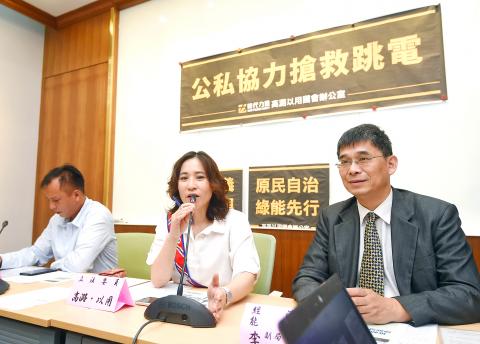A pilot program by the Bureau of Energy to subsidize civic groups’ “clean energy” generating facilities in the nation’s remote areas could help build a new energy model in Taiwan, New Power Party Legislator Kawlo Iyun Pacidal said yesterday.
Kawlo in September last year urged Premier William Lai (賴清德) to balance the needs for clean energy and energy justice during a question-and-answer session at the Legislative Yuan.
In response, the bureau on May 20 set down guidelines for subsidizing the construction of clean energy generating facilities in remote areas by civic groups.

Photo: Fang Pin-chao, Taipei Times
“The program will allow residents in remote areas, especially Aborigines, to lead the development of clean energy generating facilities. This will not only help promote energy democracy, but also better ensure that those areas have sufficient energy,” said Kawlo, who is Amis.
Considering that the nation is highly dependent on Taiwan Power Co (Taipower) for energy, the project would also improve the stability of the nation’s energy supply, she said.
Many Aboriginal communities in remote areas have the natural resources to develop solar, hydroelectric or geothermal power plants, but building those facilities would require collaboration, bureau Deputy Director-General Lee Chun-li (李君禮) said.
“The bureau used to focus on building power supply systems with Taipower in remote areas, but now we hope to encourage residents in those areas to lead such projects,” he said.
Such facilities could provide backup power to local communities when Taipower facilities are damaged by natural disasters, Lee added.
“If they have any surplus energy, communities can also profit from that by selling it to Taipower,” he said.
The bureau is to accept 10 proposals to build clean energy generating facilities in remote areas and provide a subsidy of up to NT$2 million (US$66,912) to each project to cover expenses in the initial assessment stage.
“Civic groups only need to have a rough idea of what kind of facility they would like to build, and the government would help pay the expenses needed to hire professionals for further investigation and assessments,” Li said.
In addition, the government would subsidize up to half of the construction expenses — with a cap of NT$10 billion — for each of the five cases that have passed initial reviews.
Aboriginal groups would have higher priority than other groups, the bureau said, adding that the deadline for applications is Aug. 31.
“We hope to learn from this process and are ready to make adjustments if anything needs to be changed,” Lee said.
The program requires the government to inform Aborigines and obtain their consent before building power generating facilities in their communities, Kawlo said, adding: “Community residents can be masters of their own fate and lead local energy plans.”
Hopefully, this program will soon create the first energy plant jointly built by civic groups and the government, she said.

Taiwan is stepping up plans to create self-sufficient supply chains for combat drones and increase foreign orders from the US to counter China’s numerical superiority, a defense official said on Saturday. Commenting on condition of anonymity, the official said the nation’s armed forces are in agreement with US Admiral Samuel Paparo’s assessment that Taiwan’s military must be prepared to turn the nation’s waters into a “hellscape” for the Chinese People’s Liberation Army (PLA). Paparo, the commander of the US Indo-Pacific Command, reiterated the concept during a Congressional hearing in Washington on Wednesday. He first coined the term in a security conference last

Prosecutors today declined to say who was questioned regarding alleged forgery on petitions to recall Democratic Progressive Party (DPP) legislators, after Chinese-language media earlier reported that members of the Chinese Nationalist Party (KMT) Youth League were brought in for questioning. The Ministry of Justice Investigation Bureau confirmed that two people had been questioned, but did not disclose any further information about the ongoing investigation. KMT Youth League members Lee Hsiao-liang (李孝亮) and Liu Szu-yin (劉思吟) — who are leading the effort to recall DPP caucus chief executive Rosalia Wu (吳思瑤) and Legislator Wu Pei-yi (吳沛憶) — both posted on Facebook saying: “I

The Ministry of Economic Affairs has fined Taobao NT$1.2 million (US$36,912) for advertisements that exceed its approved business scope, requiring the Chinese e-commerce platform to make corrections in the first half of this year or its license may be revoked. Lawmakers have called for stricter enforcement of Chinese e-commerce platforms and measures to prevent China from laundering its goods through Taiwan in response to US President Donald Trump’s heavy tariffs on China. The Legislative Yuan’s Finance Committee met today to discuss policies to prevent China from dumping goods in Taiwan, inviting government agencies to report. Democratic Progressive Party Legislator Kuo Kuo-wen (郭國文) said

The Ministry of Economic Affairs has fined Taobao NT$1.2 million (US$36,900) for advertisements that exceeded its approved business scope and ordered the Chinese e-commerce platform to make corrections in the first half of this year or its license would be revoked. Lawmakers have called for stricter supervision of Chinese e-commerce platforms and more stringent measures to prevent China from laundering its goods through Taiwan as US President Donald Trump’s administration cracks down on origin laundering. The legislature’s Finance Committee yesterday met to discuss policies to prevent China from dumping goods in Taiwan, inviting government agencies to report on the matter. Democratic Progressive Party